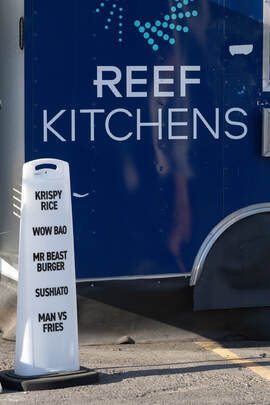 Guest Blog | Miller Nash LLP Key Considerations for Virtual Restaurant Brand Deals Though not an entirely new concept, pandemic-related shutdowns have hastened the growth of ghost kitchens and delivery-only virtual brands, opening up a new potential line of business for local restaurants looking to expand into the new world of app-driven purchases. When talking about “ghost kitchens” – there are two primary types of venture to consider. The first involves a brick and mortar space (or food cart) that, through a licensing agreement with a virtual restaurant brand, handles fulfillment for the virtual brand out of its existing space, with its own staff and equipment, often in addition to operating its own brand. The second is a brick-and-mortar space that rents out a kitchen (or station within a kitchen) to restauranteurs. While the second form of “ghost kitchen” has its own set of unique legal considerations (including real estate and insurance issues), this article explores some of the key deal points to consider when entering into an arrangement for the first type of opportunity, the virtual-only brand deal. General Considerations for Virtual Brand Licensing Deals Over the past year, a variety of virtual brands have started offering local restaurants and food carts the opportunity to offer their delivery-focused concepts (for example, musician Mariah Carey’s cookie brand, and YouTube star MrBeast’s burger chain). In general, a virtual brand will provide recipes, certain know-how, and packaging/labels, together with a right to use the brand and fulfill orders in a given territory, and the brick-and-mortar restaurant or food cart will provide the facilities, equipment, staff, and ingredients to produce the actual orders as they come in. In addition to the basic division of responsibilities, other operational considerations include how revenue or fees are calculated and paid, what fulfillment platforms are to be used, the scope of the territory, and any promotional obligations of the parties. Among other terms to be negotiated on the legal front, consider:
Intellectual Property Licensing Terms Intellectual property is at the heart of any virtual brand deal–the logos, trademarks, and trade names of the brand are arguably its most valuable asset, not to mention proprietary recipes, processes, and know-how that may be used by the restaurant throughout the fulfillment process. While the virtual brand will have an obvious interest in ensuring a brand licensing agreement clearly protects the brand’s intellectual property, restaurants should also pay close attention to the intellectual property provisions of an agreement. At minimum, a restaurant needs to ensure it is granted a sufficient license to perform its obligations under the agreement, and should seek to get a representation from the brand that its marks do not infringe on the rights of third parties (in addition to indemnification in the event of a breach of that representation). Another point to consider is which party should own any improvements to the intellectual property (which may be particularly relevant if proprietary recipes are part of the licensed assets). Particularly in the event of celebrity-driven virtual brands, note that your licensing agreement may ultimately be subject to a second licensing agreement further upstream giving a virtual dining company the right to use a celebrity’s name, image, likeness, and other rights. While this may ultimately not be a negotiable term, understand that your agreement may be terminable on short notice if those rights are no longer available for use. Employment Considerations and Relationship of the Parties Also essential to a virtual restaurant endeavor is clear definition of the relationship of the parties. Entering into a partnership or joint venture may have negative tax impacts and other legal implications, and in general, parties should enter into a virtual brand licensing agreement as independent contractors. For the protection of both parties, care should be taken to describe the employment relationship (or lack thereof) between the brand and the restaurant’s staff, who remain solely employed by the restaurant. In some cases, virtual dining concepts may be executed as a franchisor/franchisee relationship, subjecting the parties to the unique and often complex bounds of franchise law. While you should work with an attorney on any virtual brand deal, be sure to consult an attorney with franchise-specific experience if you are asked to enter into a franchise agreement or have questions as to whether your arrangement is really a franchising relationship. These are just a few of many considerations for restaurants to consider when negotiating “ghost kitchen”/virtual brand deals. After the forced growth of digital ordering during the recent stay-at-home era, delivery-only concepts are likely here to stay, presenting an exciting growth opportunity for restaurants with additional capacity to fulfill online orders. | Nic Mayne, Miller Nash LLP Nic Mayne is a business attorney with Miller Nash LLP. A graduate of Harvard Law, Nic’s practice focuses on reviewing, drafting, and negotiating contracts for businesses and individuals (including restaurants and celebrity virtual dining start-ups), such as intellectual property licenses and assignments; marketing and advertising agreements; manufacturing, distribution and supply agreements; and governing documents for various entities and joint ventures. Nic also guides clients through the M&A process and investment offerings. Nic can be reached at [email protected] or 503.205.2336. This guest blog was submitted by Miller Nash LLP. For more information on guest blog opportunities, contact Marla McColly, Business Development Director, Oregon Restaurant & Lodging Association.
Comments are closed.
|
Categories
All
Archives
June 2024
|
Membership |
Resources |
Affiliate Partners |
Copyright 2024 Oregon Restaurant & Lodging Association. All Rights Reserved.
8565 SW Salish Lane Suite 120 | Wilsonville, OR 97070-9633 | 503.682.4422 | 800.462.0619 | Contact Us
Site Map | Accessibility | Privacy Policy
8565 SW Salish Lane Suite 120 | Wilsonville, OR 97070-9633 | 503.682.4422 | 800.462.0619 | Contact Us
Site Map | Accessibility | Privacy Policy

 RSS Feed
RSS Feed


